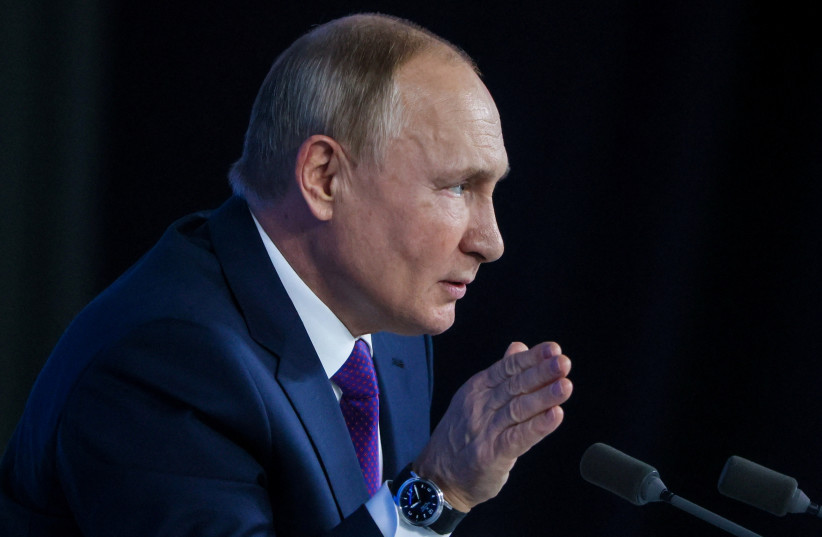No empire had ever fallen more quickly and swiftly.
“Gorbachev, last Soviet leader, resigns,” as The New York Times banner headline stated, was the surrender note. “US recognizes republics’ independence,” the same headline’s end, was the trigger. And the sub-headline, “Communist flag is removed,” was the aftermath of the Soviet Union’s death, 30 years ago last month.
Curiously enough, the Soviet imperium, though armed to its teeth, passed away before its 75th birthday, younger than any previous world power. Shattered with it were some of the most spectacular dreams humans ever dreamed.
The revolution that promised a new Soviet man, “imbued with selfless devotion to the common good, ended up all but crushing the initiative and the spirit of the people, making many devoted only to vodka,” wrote The New York Times’ Serge Schmemann as the communist flag was being removed from above Lenin’s Mausoleum.
The promise to replace czarism with humanism, peace, and freedom made way for “the world’s most militarized and ruthless police state.” Promising “a people’s culture,” the Soviets created “an anti-culture in which talent was ruthlessly persecuted.”
In the end, concluded the Times’ former Moscow bureau chief, the same USSR that “promised a new life” produced “an unspeakable bleak society – polluted, chronically short of everything, stripped of initiative and spirituality.”

It was a spectacular experiment’s well-said obituary. Even so, the Kremlin’s current tenant now seems eager to exhume the Soviet Empire, have it walk among the living, and thus make it the envy of the dead.
Like the dreams that inspired the Soviet experiment, it’s a good way to escape reality, and a very bad way to shape it.
FROM OUR Western viewpoint, the USSR fell because it suppressed freedom. The economic meltdown that animated the downfall was only the result of this oppression. So was the imperial overreach. Had public opinion been involved, goes our Western thinking, Afghanistan might not have been invaded.
The same goes for the economy. Had ownership, salaries, hiring and banking been free, the Soviet Empire might have lived longer, goes our thinking. And since distrust of the individual was a central part of Soviet thinking, the Soviet downfall was predestined.
That’s not Vladimir Putin’s analysis.
In his view, the USSR fell not because of its oppression, but because Russia, the empire’s engine, heart and glue, momentarily lost its grip on its realms.
Unlike the empire for which he longs, Putin does not believe in communism. Yes, his version of capitalism – nurturing one set of tycoons and eliminating others – is not Winston Churchill’s. Still, there is a stock market in Moscow, the ruble is a freely floating currency, there are no breadlines, and Russians are free to own stores, factories, hotels, malls, mines, airlines, you name it.
Putin is also not the atheist Soviet leaders were; on the contrary. An openly practicing Orthodox Christian, he grew up going regularly to church with his mother, who also secretly baptized him.
Putin is also devoid of the Soviet Union’s Jewish complex. Under his rule, Judaism is practiced freely, synagogues and Jewish schools operate freely, and the Jewish state is treated with respect.
Still, for Putin, the USSR’s downfall “was the greatest geopolitical catastrophe of the century,” one that triggered “an epidemic of collapse that spilled over to Russia itself,” as he told parliament in 2005. The “catastrophe” was not the collapse of the communist idea, in which he did not believe, but the collapse of the empire to which it gave rise, and in which he did believe.
The Soviet Union was “historical Russia,” as Putin told Russian TV last month, and its dissolution meant that “what had been built up over 1,000 years was largely lost.”
What began with separatist dynamics abroad soon penetrated the Russian Federation, he explained, resulting in the Chechen Revolt. Before that, the secession of the Soviet republics stranded some 25 million ethnic Russians outside a suddenly shrunken Russian border, adding up to “a major humanitarian tragedy.”
This is not communist nostalgia. It is nationalism. And nationalism can be a good idea, one that fosters social solidarity and international harmony. Tragically, that is not the version of nationalism with which Putin has come to tinker.
NATIONALISM came in two versions. One, the humanistic, was that of Italian thinker Giuseppe Mazzini (1805-1872), who thought that every nationality deserves independence, and that once mankind becomes a collection of free nations its path to freedom and peace would be paved.
At its other extreme nationalism produced fascism, the belief that opposition must be suppressed and neighbors must be subdued.
The Eastern Bloc’s downfall produced aspects of both extremes. Yugoslavia’s divorced republics turned to war, Czechoslovakia’s to peace.
Russia initially avoided the Yugoslav path. It exchanged ambassadors with its neighbors, and they in turn forfeited their portions of the Soviet nuclear arsenal. This attitude ended in 2008, when Russia invaded Georgia, a belligerency later multiplied with the invasion of Ukraine.
Picking fights with neighbors came at the expense of economic and social development.
The shackling of the economy to oil and gas exports, which make 60% of Russian exports, is an economic deformity that ignores the outer world’s steady passage to renewable energy. The average wage is hardly $1,000. Life expectancy, at 73.2, is seven years lower than the developed world’s.
In short, like the USSR in its time, Russia’s problem lies not in its size but in its guts.
Even so, with his era in its third decade, Putin now surveys his marching troops, glistening missiles and roaring fighter jets, and thinks he can escape Russia’s real problems by embarking on military adventures. In a nutshell, this is how the Red Army arrived in Afghanistan, and how the Soviet Union arrived in history’s dustbin.
The writer’s bestselling 'Mitzad Ha’ivelet Ha’yehudi' ('The Jewish March of Folly,' Yediot Sefarim, 2019), is a revisionist history of the Jewish people’s leadership from antiquity to modernity.
